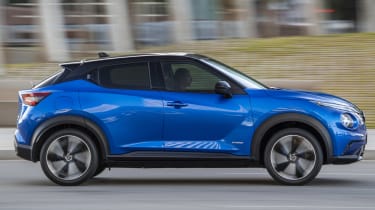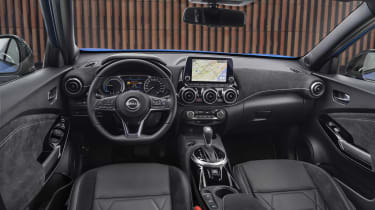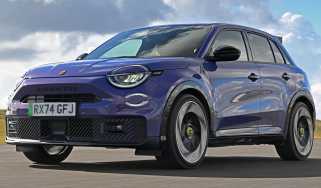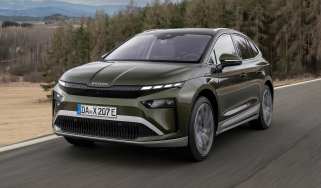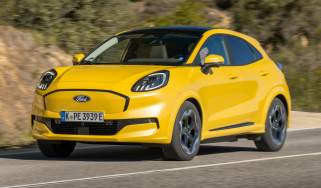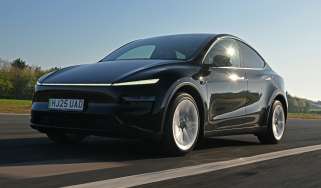New 2022 Nissan Juke Hybrid: prices, specs and details
The Nissan Juke compact SUV is now available with hybrid power; prices start from £27,250
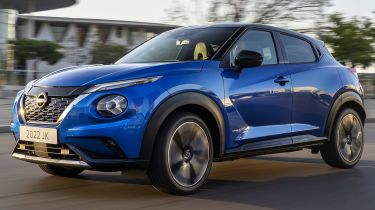
The Nissan Juke is now available with hybrid power for the first time since the popular compact SUV launched over a decade ago. It takes on a raft of competitors, including the Toyota Yaris Cross, Renault Captur E-TECH, Kia Niro Hybrid and Hyundai Kona Hybrid.
Prices start from £27,250, which is £3,000 more than its Toyota or Hyundai rivals, while the higher-spec Tekna and Tekna+ models are priced at £28,750 and £30,150 respectively. There’s also a limited-run Premiere Edition, which starts from £28,250; these will be the first models to arrive in showrooms in July.
The electrified Juke shares its hybrid powertrain with the Renault Captur E-TECH, thanks to an alliance between the brands. It uses a 1.6-litre petrol engine with 93bhp and an electric motor producing 48bhp. Their 141bhp combined output makes this the most potent Juke in the range. The electric motor is powered by a 1.2kWh battery with liquid cooling, and both power sources use an automatic gearbox derived from Formula 1 technology.
Nissan says the Juke Hybrid will always start using electric power and that 80% of driving can be completed with the electric motor in urban environments; the brand claims this will provide an ‘EV-like’ driving experience. The car also gets an EV mode for pure-electric driving.
Nissan also claims the electrified SUV can return up to 56.5mpg fuel economy, while CO2 emissions range from 114 to 115g/km, compared to just under 59mpg and 104g/km for the latest Kia Niro Hybrid. Those figures are at least improvements over the petrol-engined Juke’s 47.9mpg and 134g/km of CO2.
Drivers can adjust the level of regenerative braking, with Sport mode producing stronger deceleration and feeding more energy back into the battery. Eco and Normal modes also affect the steering weight, engine response and climate control. The Juke Hybrid also features a version of Nissan’s ‘e-Pedal’, which allows the speed of the car to almost entirely be controlled using just the accelerator pedal. However, unlike some electric cars, this will only slow the Juke to 3mph, so the brake pedal is still needed to bring it to a halt.
There are some exterior changes, too, including Nissan’s latest logos and a black piece of trim at the leading edge of the bonnet, along with a smaller grille. The Hybrid doesn’t require as much cooling, so a shutter is also fitted to close the grille and reduce drag when fresh air isn’t required.
New 17-inch and optional 19-inch alloy wheels are available, there’s ‘Hybrid’ badging on the front doors and a myriad of small aerodynamic tweaks (including beneath the car) have been designed to help the crossover slip through the air, including a new rear spoiler.
Inside, the biggest change is a new set of instruments, replacing the rev counter with a dial to show power usage and the level of regenerative charging as the car slows down. A seven-inch screen in the instrument cluster can also show the flow of energy between the combustion engine, electric motor and battery pack to the wheels.
Unfortunately, practicality has taken a hit in the Juke Hybrid, with a 68-litre reduction in boot size from the petrol version, to 354 litres, due to the presence of the battery. Fold down the rear seats and there’s 1,237 litres of loading space, while rear kneeroom is unchanged, at 553mm.
While the Japanese manufacturer was early to market with fully electric models like the Nissan Leaf, it has been slow to electrify the rest of the range – a process that’s now gaining momentum with the popular Nissan Qashqai and zero-emissions Nissan Ariya. By 2023, Nissan plans to have a fully electrified range, as well as launch 15 new electric cars between now and 2030. That includes a crossover EV to replace the Leaf, and an electric Micra supermini successor.

